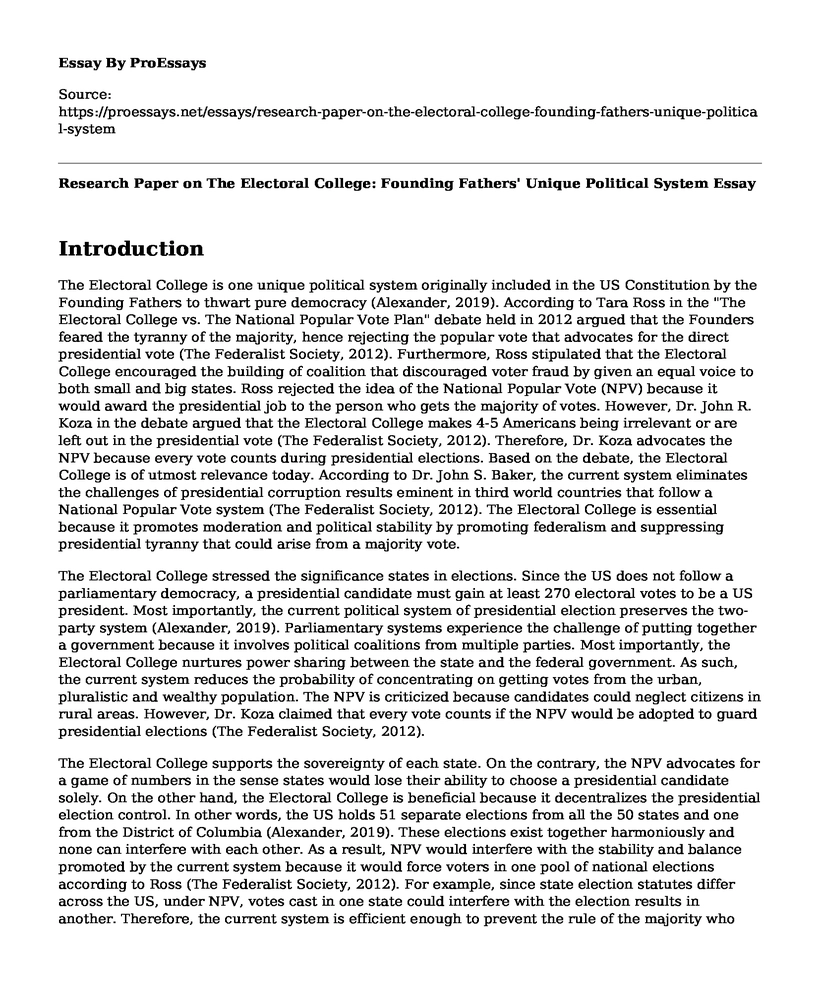Introduction
The Electoral College is one unique political system originally included in the US Constitution by the Founding Fathers to thwart pure democracy (Alexander, 2019). According to Tara Ross in the "The Electoral College vs. The National Popular Vote Plan" debate held in 2012 argued that the Founders feared the tyranny of the majority, hence rejecting the popular vote that advocates for the direct presidential vote (The Federalist Society, 2012). Furthermore, Ross stipulated that the Electoral College encouraged the building of coalition that discouraged voter fraud by given an equal voice to both small and big states. Ross rejected the idea of the National Popular Vote (NPV) because it would award the presidential job to the person who gets the majority of votes. However, Dr. John R. Koza in the debate argued that the Electoral College makes 4-5 Americans being irrelevant or are left out in the presidential vote (The Federalist Society, 2012). Therefore, Dr. Koza advocates the NPV because every vote counts during presidential elections. Based on the debate, the Electoral College is of utmost relevance today. According to Dr. John S. Baker, the current system eliminates the challenges of presidential corruption results eminent in third world countries that follow a National Popular Vote system (The Federalist Society, 2012). The Electoral College is essential because it promotes moderation and political stability by promoting federalism and suppressing presidential tyranny that could arise from a majority vote.
The Electoral College stressed the significance states in elections. Since the US does not follow a parliamentary democracy, a presidential candidate must gain at least 270 electoral votes to be a US president. Most importantly, the current political system of presidential election preserves the two-party system (Alexander, 2019). Parliamentary systems experience the challenge of putting together a government because it involves political coalitions from multiple parties. Most importantly, the Electoral College nurtures power sharing between the state and the federal government. As such, the current system reduces the probability of concentrating on getting votes from the urban, pluralistic and wealthy population. The NPV is criticized because candidates could neglect citizens in rural areas. However, Dr. Koza claimed that every vote counts if the NPV would be adopted to guard presidential elections (The Federalist Society, 2012).
The Electoral College supports the sovereignty of each state. On the contrary, the NPV advocates for a game of numbers in the sense states would lose their ability to choose a presidential candidate solely. On the other hand, the Electoral College is beneficial because it decentralizes the presidential election control. In other words, the US holds 51 separate elections from all the 50 states and one from the District of Columbia (Alexander, 2019). These elections exist together harmoniously and none can interfere with each other. As a result, NPV would interfere with the stability and balance promoted by the current system because it would force voters in one pool of national elections according to Ross (The Federalist Society, 2012). For example, since state election statutes differ across the US, under NPV, votes cast in one state could interfere with the election results in another. Therefore, the current system is efficient enough to prevent the rule of the majority who would ignore the minority under NPV (The Federalist Society, 2012). Nevertheless, the Electoral College eliminates these problems fostering a better system of a presidential election.
Conclusion
In conclusion, the Electoral College is a fundamental building block in the US presidential elections. It eliminates permanent majority and minority according to Dr. Baker and has eliminated chances of an electoral tie. The Electoral College has eliminated electoral fraud as evident in multi-party countries.
References
Alexander, R. M. (2019). Federalism and the Electoral College. Representation and the Electoral College, 62-92. doi:10.1093/oso/9780190939427.003.0004
The Federalist Society. (2012). The Electoral College vs. The National Popular Vote Plan. Retrieved from http://www.taraross.com/av-media/the-electoral-college-vs-the-national-popular-vote-plan-video/
Cite this page
Research Paper on The Electoral College: Founding Fathers' Unique Political System. (2023, Jan 16). Retrieved from https://proessays.net/essays/research-paper-on-the-electoral-college-founding-fathers-unique-political-system
If you are the original author of this essay and no longer wish to have it published on the ProEssays website, please click below to request its removal:
- Research Paper on American Jury System
- The HRBA and the Approach Used by Kenya Essay
- Global Governance and International Institutions Essay
- Implementing Evidence in the Form of Practice Paper Example
- Realpolitik vs Liberalism: Comparing Practical Politics & Cooperation - Essay Sample
- Essay Example on Investing in Canada as a US National: Gov't Policies, Culture & Inflation
- U.S. Government: A Dynamic Political System of 3 Branches - Essay Sample







